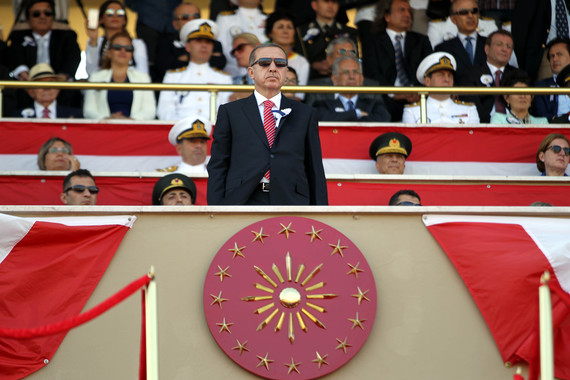In 1998, Turkey's President Recep Tayyip Erdoğan, was sent to prison for reciting a poem deemed as a crime by a Turkish court, which was then under big influence of once-powerful military. He was blamed for "inciting animosity among public."
Fifteen years later, Erdoğan pressed charges against me for tweeting a news report about a corruption scandal that implicated his government, with the same Turkish Penal Code article that landed him in jail before. His attempt to imprison me was blocked by chief Istanbul prosecutor, according to sources, and he eventually kicked me out of the country -- a measure even most authoritarian states rarely resort to. This particular incident, part of a troubling trend that set in motion a chain of anti-democratic policies in Turkey, is a bleak picture of a dramatic change Erdogan has gone through in more than a dozen years.
One needs to acknowledge Erdoğan's unparalleled contribution to Turkish economy, democracy and friendly relations with the West during his years as a prime minister, but most of these leaps have been reversed for worse. Only in the past year, his rubber-stamp parliament granted wide powers to the spy agency -- infamous for its mass profiling of citizens -- overhauled the top judicial body responsible in appointing judges and prosecutors and endorsed a law that made it possible to shut down any web site without a court order. Twitter and YouTube were shut down and Erdoğan lashed out at the Constitutional Court after it lifted the ban. Only now, his former supporters realize that his positive moves in the past were aimed at only strengthening his hand.
Following last year's heavy-handed response to summer protests linked to Gezi Park, many of Erdoğan's former supporters were disappointed in the way he ruled the nation. His unceasing actions to bury Turkey's hard-won democracy was ramped up after the recent corruption scandal. To cover up the bribery investigation that involved his son, several ministers, pro-government businessmen and chief of the state bank, the government of Erdoğan removed prosecutors supervising the probe and purged thousands of police officers across Turkey. On July 22, prosecutors launched raids to round up policemen who carried out the corruption investigation. Wife and baby of one of these policemen lost their lives in the process, the tragic epitome of ongoing despotism.
Although Turkey is an electoral democracy, the mechanism of accountability failed to work and instead awarded the government with increased votes. Even Foreign Minister Ahmet Davutoglu, blamed for many of Turkey's foreign policy woes, was promoted to become a prime minister. The crux of the problem is the government's old plan to create a loyalist media. A recent report by a Turkish labor union called DISK said 981 outspoken journalists were fired in the first half of 2014 due to the government's pressure, which means at least five journalists are being fired daily. Even independent TV channels are afraid of covering sensitive matters. Many critical journalists were charged and more than a dozen of them ended up in jail.
It is more than obvious that Erdoğan has never been a liberal democrat. He viewed democracy as a means to enhance his power. His bid to join the European Union seems to be nothing but aimed at limiting the role of military and hostile judiciary -- welcoming developments in fact -- so that he can increase his share in power. Endowed with an absolute strength today, there is no reason to think that he will get back on a democracy track again.
Washington will likely view Turkey under Erdoğan's leadership a partner that it needs to unwillingly work with, particularly at a time of turmoil in Syria and Iraq, as well as in the face of the growing menace of Russia towards Ukraine. But the U.S. cannot repeat its mistake as it did in Egypt by embracing the Muslim Brotherhood too early. Despite securing vast support from the people in two consecutive elections this year, internal political bickering within the ruling Justice and Development Party (AKP), will undoubtedly take a toll on the invincible throne Erdoğan has preserved so far.
The primary reason why the AKP was too stable until today is due to Erdoğan's charismatic character that made it impossible to challenge him. He also delicately maintained balance of power and was successful in deciding who gets what and why. His leadership was absolutely unquestionable. With his ascent to the presidency, AKP is now a boiling pot. President Abdullah Gul is alienated as well as many of his supporters in the government and parliament.
Turkey is not another China or Iran, where crackdown on dissent goes unpunished. It has a long tradition of democracy; its economy deeply integrated into the West and its people clamoring for dignity and freedom. It is highly unlikely that the vibrant and modern Turkish society will tolerate such an authoritarian drift for long.
Washington must push Ankara to do more as part of their strong alliance, including fighting the so-called Islamic State militants, but it must at least wait and see how this internal reckoning within the ruling AKP turns out before it makes any enduring engagement with the Turkish government in other spheres.

